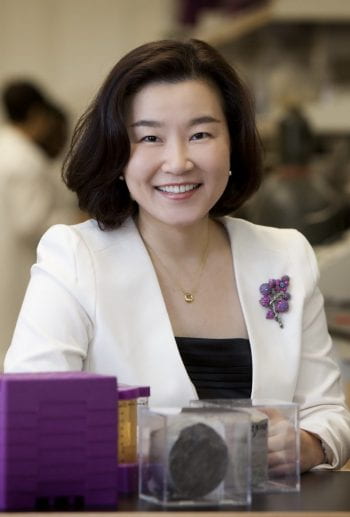Research should not be isolated to the laboratory.
At least that is what Young-Shin Jun, the Harold D. Jolley Career Development associate professor at Washington University in St. Louis, believes. Jun came to the university in January of 2008, joining the Department of Energy, Environmental and Chemical Engineering in the School of Engineering and Applied Science.
“Our department was the first to incorporate research and education in these related disciplines,†Jun said. “When I decided to come to WashU, it was quite clear that this was the only department that combined all these crucial disciplines without any boundaries, which made it stand out among peer institutions.â€
For Jun, research means exploring multiple topics to address one grand challenge: environmental sustainability. In her work, Jun sees the four areas of energy security, water supply, food, and climate change as interconnected. Like dominoes, what happens in one area has chain reactions that inevitably affect the others.
Jun’s laboratory focuses on improving our understanding of the transport of contaminants, nutrients and nanoparticles and its consequences, providing more environmentally sustainable strategies for capturing CO2 , and elucidating the physicochemical reactions that occur during water reuse through managed aquifer recharge and reverse osmosis membrane processes.
When she first arrived at WashU, she wanted her research to have an impact beyond academic circles, but she wasn’t quite sure how to make it happen. That changed once she met with Victoria May, the executive director of the Institute for School Partnership (ISP) at WashU.
What began as a few meetings quickly catalyzed into a powerful partnership between Jun’s lab and the local K-12 education community. Jun brought in middle school teacher Megan Edwards and ISP’s assistant director Rachel Ruggirello to work with her research team. Together, they were able to translate cutting-edge research into hands-on science activities for middle school students.
“If research outcomes do not benefit our society, their impact is severely limited,†Jun said. “So as an engineer, I’m always thinking about how to translate research findings into applications which can change our lives, and that means engaging the interest of many other people.â€
Because of this dedication to outreach, Jun has worked with over 80 teachers, impacting roughly 2,000 students through various programs, workshops and lectures. In April of 2016, Jun and Edwards, along with Ruggirello, presented their work at the National Science Teachers Association (NSTA) conference, reaching teachers from across the country.
In addition to the impact that her work has on educators, Jun ensures that her undergraduate and graduate students understand the importance of outreach, encouraging each of them to participate in their own efforts to give back.
“My undergraduate and graduate students and the new research findings of their projects are the strong engine that powers outreach efforts,†said Jun. “When my team is in class and senses the positive energy and needs, they feel really motivated about helping students in the greater St. Louis area. They learn precious lessons about their roles in society through these experiences, as well.â€
The ISP’s Ruggirello says it is clear how much Jun values outreach and that it is amazing to see students as young as 6th grade grasping complex topics.
“Her ability to communicate with teachers about the importance and excitement of her work definitely compels them to bring this information back to their students, inspiring them to consider seeking out a STEM career to tackle global issues,†Ruggirello said. “She is extremely skilled at bringing authentic research to K-12 teachers and students.â€
